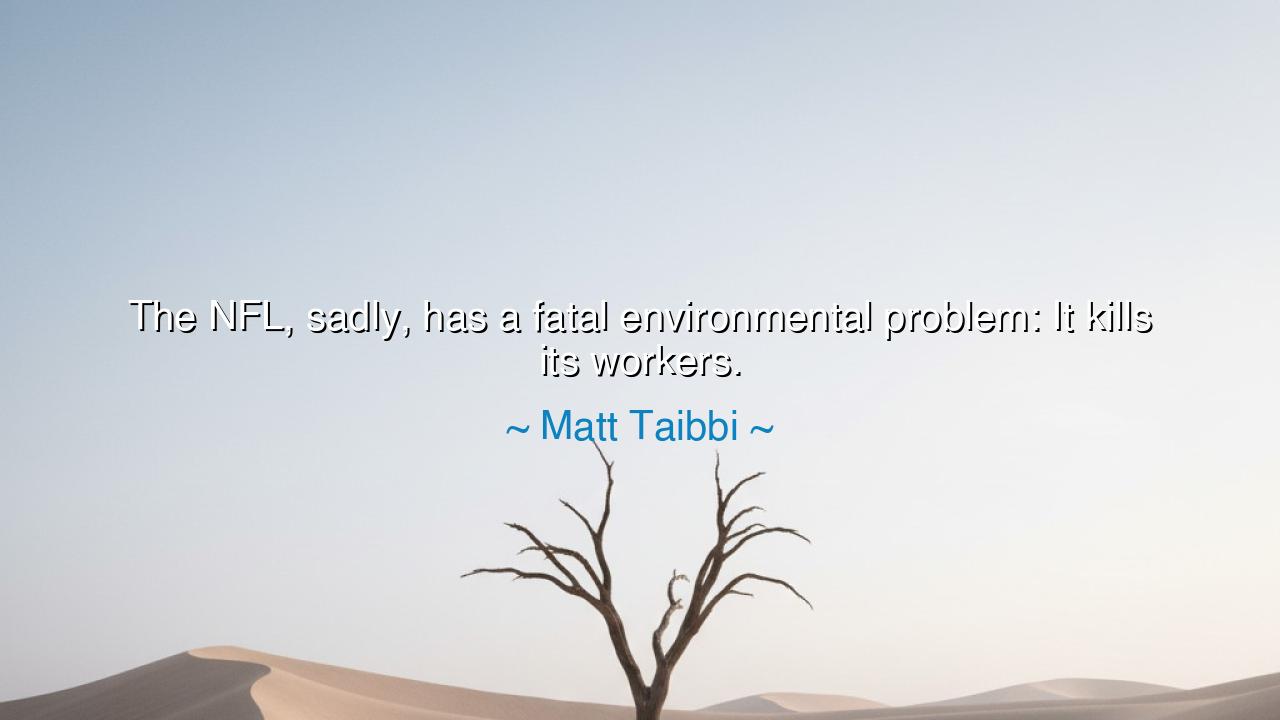
The NFL, sadly, has a fatal environmental problem: It kills its






Hear the fierce lament of Matt Taibbi, spoken with the sorrow of one who sees beyond spectacle: “The NFL, sadly, has a fatal environmental problem: It kills its workers.” These are not words of exaggeration, but of mourning. For beneath the roaring stadiums, the flashing lights, and the billions in profit, lies a darker truth: that the very game adored by millions grinds down the bodies and minds of those who play it, leaving broken men in its wake. Taibbi names this not as an accident, but as an environmental problem, a disease woven into the very system of the sport itself.
The meaning of his words rests in the recognition that the environment of the NFL is one of violence disguised as entertainment. The collisions cheered by crowds are the same blows that bring concussions, brain trauma, shattered bones, and shortened lives. Over years, these wounds accumulate, unseen at first, but later manifesting as depression, dementia, and even suicide. To call it “killing its workers” is not mere metaphor; it is the stark reality for countless former players who, after years of sacrifice, find themselves abandoned by the very league they enriched.
History offers us the tragic example of Mike Webster, once a legendary center for the Pittsburgh Steelers. After his career ended, Webster descended into poverty, pain, and confusion, his brain ravaged by chronic traumatic encephalopathy (CTE), a disease linked to repeated concussions. He became the first NFL player diagnosed with the condition after death. His story, immortalized in medical journals and films, revealed the hidden cost of the game. And he was not alone—scores of others followed, their names etched in lawsuits and obituaries, victims of an environment that prized profit over protection.
The ancients, too, knew this pattern. In the arenas of Rome, gladiators fought for the joy of crowds and the wealth of their masters. They were celebrated in life and discarded in death, their broken bodies the unspoken cost of empire’s entertainment. The NFL, in Taibbi’s telling, becomes a modern Colosseum, its workers both heroes and sacrifices, slain not by sword but by the repeated violence of the game itself. The lesson echoes across centuries: when spectacle demands human lives, it becomes a feast of destruction.
Yet Taibbi’s words are also a call to awareness. By naming the problem as environmental, he widens the scope of responsibility. It is not merely the fault of players’ choices, nor only of coaches, but of the entire system—the fans who cheer, the corporations that sponsor, the league that denies, the culture that demands violence for entertainment. An environment shapes behavior; if the environment itself is toxic, then those within it will wither. The fatal flaw lies not in individuals, but in the soil of the sport.
The lesson for us is urgent: do not be lulled by the glamour of games without asking the cost. Entertainment must never be purchased at the price of human lives. Support reforms that protect players: better helmets, stricter concussion protocols, lifelong healthcare for athletes whose bodies have been destroyed. Demand honesty from institutions that hide behind wealth and spectacle while their workers suffer. And in your own life, teach the young that glory without safety is ruin, and that strength is not proven by destruction.
Therefore, let each of us act with compassion and vigilance. Celebrate the athletes, yes, but also honor their humanity beyond the field. Refuse to turn away from the stories of their suffering. For if we applaud only the victories and ignore the broken lives left behind, then we are complicit in the very environment that Taibbi condemns.
So remember his haunting words: “The NFL kills its workers.” Let them echo not as mere accusation, but as a call to transformation. May they remind us that the worth of a man is not in the profit he generates nor in the spectacle he provides, but in the sanctity of his life. And may future generations look back not on an age that devoured its heroes, but on a time when truth was spoken, change was demanded, and justice was finally won.






AAdministratorAdministrator
Welcome, honored guests. Please leave a comment, we will respond soon